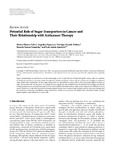Potential role of sugar transporters in cancer and their relationship with anticancer therapy

View/
Use this link to cite
http://hdl.handle.net/2183/19746Collections
- Investigación (FCS) [1293]
Metadata
Show full item recordTitle
Potential role of sugar transporters in cancer and their relationship with anticancer therapyAuthor(s)
Date
2010-06-20Citation
Blanco Calvo M, Figueroa A, Grande Pulido E, García Campelo R, Antón Aparicio L. Potential role of sugar transporters in cancer and their relationship with anticancer therapy. Int J Endocrinol. 2010; 2010
Abstract
[Abstract] Sugars, primarily glucose and fructose, are the main energy source of cells. Because of their hydrophilic nature, cells use a number of transporter proteins to introduce sugars through their plasma membrane. Cancer cells are well known to display an enhanced sugar uptake and consumption. In fact, sugar transporters are deregulated in cancer cells so they incorporate higher amounts of sugar than normal cells. In this paper, we compile the most significant data available about biochemical and biological properties of sugar transporters in normal tissues and we review the available information about sugar carrier expression in different types of cancer. Moreover, we describe the possible pharmacological interactions between drugs currently used in anticancer therapy and the expression or function of facilitative sugar transporters. Finally, we also go into the insights about the future design of drugs targeted against sugar utilization in cancer cells.
Description
Review article
Editor version
Rights
Atribución 3.0 España
ISSN
1687-8345
1687-8337
1687-8337






